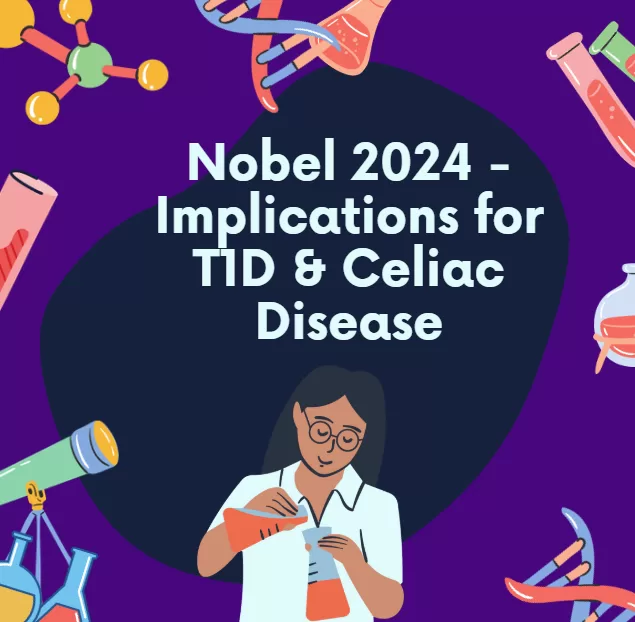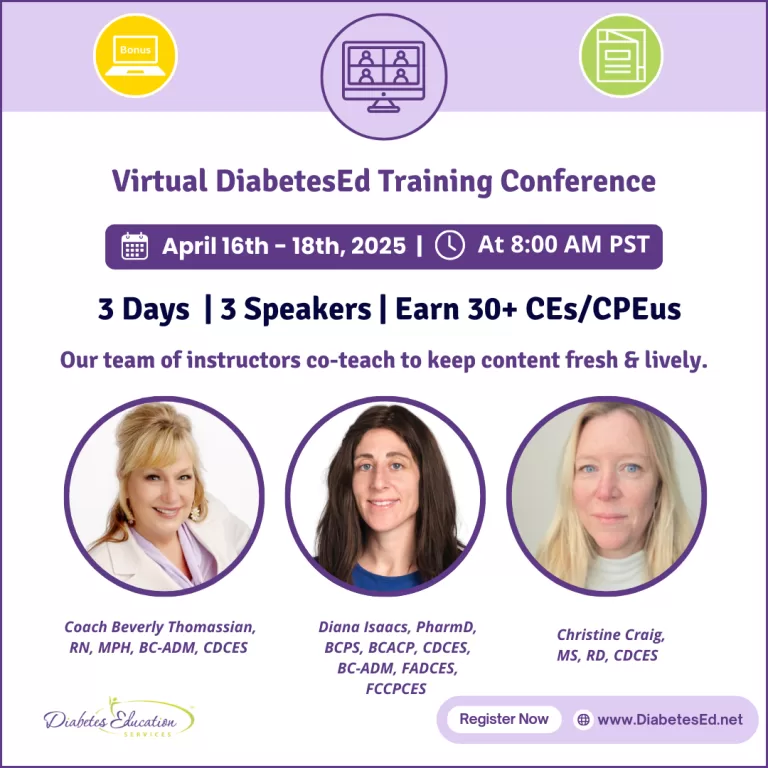 by Christine Craig, MS, RD, CDCES
by Christine Craig, MS, RD, CDCES
Type 1 diabetes and celiac disease share a fascinating connection rooted in their autoimmune nature and shared genetic background.
In T1D, autoantibodies attack the insulin-producing beta cells of the pancreas, leading to insulin deficiency. In celiac disease, ingesting gluten triggers an immune response that damages the epithelial villi of the small intestine. Recent studies suggest that approximately 6% of individuals with T1D also have celiac disease, far higher than the prevalence of celiac disease in the general population, which is around 1%.
Shared Genetic Background
T1D and celiac disease have a shared genetic background, with 95% of individuals with type 1 and 99% of individuals with celiac having the presence of HLA class II genes as DQ2 and DQ8.1 While the presence of these DQ and other alleles increases the risk of developing T1D by 30–50%, most individuals with these genetic predispositions will never progress to develop either condition, this highlights the need for deeper insights into the factors predict that disease onset and progression.
Nobel Prize Awarded
In October 2024, the Nobel Prize in Physiology or Medicine was awarded to Victor Ambros and Gary Ruvkun for discovering microRNA and its role in post-transcriptional gene regulation.2 As we recall, messenger RNA is created by copying a gene sequence from DNA, carrying this genetic code to the ribosomes for protein synthesis- microRNAs up or down-regulate and “fine-tune” gene expression.2 MicroRNAs could be utilized to track what genes are expressed and in which cells. They could potentially be used as a tool for early detection and biomarkers of disease progression.
In T1D genetic risk combined with a triggering event leads to expression of autoantibodies. BreakthoughT1, previously JDRF,3 funded additional research on microRNA due to the potential to increase early prediction of T1D autoimmunity, provide additional biomarkers of Stage 1 and Stage 2 T1D progression, and for its potential to modulate the immune system by slowing down or ceasing autoimmune response. In celiac disease, tissue transglutaminase (TGA) and anti-endomysium autoantibody concentrations are used to screen individuals at risk of celiac disease, however these autoantibodies are often elevated when villous atrophy is already present. An article by Tan and colleagues4 reviewed 53 microRNAs as potential biomarkers of celiac disease, some were found more than a year before tissue transglutaminase (TGA) positivity, and some became normalized with initiation of a gluten-free diet.
microRNA enable earlier detection?
microRNA has the potential for early detection before the onset of intestinal damage. In both celiac disease and T1D, we currently use autoantibodies as predictors of disease development, but it is the biopsy of the villi4 or glucose levels that truly diagnose the stage of the disease. microRNAs may enable earlier detection of disease progression before significant damage occurs, revolutionizing current diagnostic and monitoring approaches.
AI to Develop Proteins to Treat Disease?
Another 2024 Nobel Prize awarded in Chemistry, also has implications for T1D and celiac research. David Baker, Demis Hassabis, and John Jumper received their prize for using artificial intelligence (AI) to develop computational protein design and predict protein structure.2 Their research led to the development of a new way to create proteins that have the potential to treat disease, make vaccines, and, important to T1D, develop new glucose-responsive insulins. These glucose-responsive insulins are currently in clinical trials and can activate in response to glucose needs after injection.5 In addition, their research led to the development of TAK-062, an investigational treatment aimed at improving gluten tolerance in individuals with celiac disease.6 TAK-062 holds promise as a therapeutic option to ease the burden of a strict gluten-free diet, which is currently the only treatment for celiac disease.
New Scientific Developments to Provide Future Benefits
Science continues to pave the way for new targeted therapies, and the 2024 Nobel Prizes highlight the breakthroughs which can benefit individuals with autoimmune conditions such as T1D and celiac diseases. The discoveries in protein design and microRNA regulation show promise for additional tools for prediction, early detection, and targeted therapies. Until then, nutrition therapy, diabetes education and a comprehensive team-based care approach remain the cornerstone of managing these complex conditions. If you’re interested in learning more check out all of the Nobel Prize winners here.
References
- Flores Monar GV, et al. Association Between Type 1 Diabetes Mellitus and Celiac Disease: Autoimmune Disorders with a Shared Genetic Background. Cureus. 2022 Mar 7;14(3):e22912.
- Nobel Prize Committee. (2024). Press Release: Retrieved from www.nobelprize.org
- Breakthrough T1D and the Nobel Prizes: Connected!. Downloaded on November 17th, 2024.
- Tan IL, et al. Circulating miRNAs as Potential Biomarkers for Celiac Disease Development. Front Immunol. 2021 Dec 7;12:734763.
- Yun Liu, Shiqi Wang, Zejun Wang, Jicheng Yu, Jinqiang Wang, John B. Buse, Zhen Gu; Recent Progress in Glucose-Responsive Insulin. 20 August 2024; 73 (9): 1377–1388.
- The 2024 Nobel Prize in Chemistry goes to a leading celiac researcher. Downloaded on November 18, 2024.
Want to hear more from this expert?
Join our upcoming Virtual Conference!!
Join Coach Beverly and Team for two and a half days of knowledge-sharing, fun, and “aha” moments for our Virtual DiabetesEd Training Conference.
Attendees will leave this conference with new tools and a refreshed understanding of the latest advances in person-centered diabetes care. Our team highlights the ADA Standards of Care, medications, behavior change, technology, medical nutrition therapy, and more!
Our instructors co-teach the content to keep things fresh and lively.
Sign up for Diabetes Blog Bytes – we post weekly Blog Bytes that are informative and FREE! Every week we post one exam practice Question of the Week and Rationale of the Week. Sign up below!
The use of DES products does not guarantee the successful passage of the certification exam. CBDCE and ADCES do not endorse any preparatory or review materials for the CDCES or BC-ADM exams, except for those published by CBDCE & ADCES.









